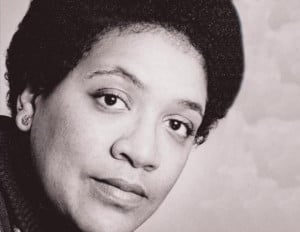Podcast: Play in new window | Download
Uses of The Erotic: The Erotic as Power
In this podcast episode, we share an excerpt from Lorde’s incredible essay Uses of The Erotic: The Erotic as Power, available in many formats and as part of the collection titled Sister Outsider.
This excerpt highlights the joy that eroticism opens up in our entire lives. She speaks about “the erotic” as being different that the sexual or the pornographic. The erotic is beyond the sexual, it is the joy and fulfillment we can source with our entire being.
We have all experienced a sexual encounter, either solo or partnered, that were merely functional as opposed to experiences where your entire being was awakened, aroused and excited. Those are erotic encounters that raise the bar of what is possible for your experience of pleasure and joy. This capacity goes far beyond the bedroom. Lorde argues that once you source your true eroticism, you can find joy, connection and worthiness in the rest of your life.
Here is a full recording of this incredible offering:
Here are some of our favorite excerpts:
Audre Lorde’s Uses of The Erotic: The Erotic as Power

“The erotic is a measure between our sense of self and the chaos of our strongest feelings. It is an internal sense of satisfaction to which, once we have experienced it, we know we can aspire. For having experienced the fullness of this depth of feeling and recognizing its power, in honor and self-respect we can require no less of ourselves.
It is never easy to demand the most from ourselves, from our lives, from our work. To encourage excellence is to go beyond the encouraged mediocrity of our society is to encourage excellence. But giving in to the fear of feeling and working to capacity is a luxury only the unintentional can afford, and the unintentional are those who do not wish to guide their own destinies.
This internal requirement toward excellence which we learn from the erotic must not be misconstrued as demanding the impossible from ourselves nor from others. Such a demand incapacitates everyone in the process. For the erotic is not a question only of what we do; it is a question of how acutely and fully we can feel in the doing. Once we know the extent to which we are capable of feeling that sense of satisfaction and completion, we can then observe which of our various life endeavors bring us closest to that fullness.
The aim of each thing which we do is to make our lives and the lives of our children richer and more possible. Within the celebration of the erotic in all our endeavors, my work becomes a conscious decision – a longed-for bed which I enter gratefully and from which I rise up empowered.
The erotic functions for me in several ways, and the first is in providing the power which comes from sharing deeply any pursuit with another person. The sharing of joy, whether physical, emotional, psychic, or intellectual, forms a bridge between the sharers which can be the basis for understanding much of what is not shared between them, and lessens the threat of their difference.
Another important way in which the erotic connection functions is the open and fearless underlining of my capacity for joy, in the way my body stretches to music and opens into response, harkening to its deepest rhythms so every level upon which I sense also opens to the erotically satisfying experience whether it is dancing, building a bookcase, writing a poem, or examining an idea.
That self-connection shared is a measure of the joy which I know myself to be capable of feeling, a reminder of my capacity for feeling. And that deep and irreplaceable knowledge of my capacity for joy comes to demand from all of my life that it be lived within the knowledge that such satisfaction is possible.
This is one reason why the erotic is so feared, and so often relegated to the bedroom alone, when it is recognized at all. For once we begin to feel deeply all the aspects of our lives, we begin to demand from ourselves and from our life-pursuits that they feel in accordance with that joy which we know ourselves to be capable of.”